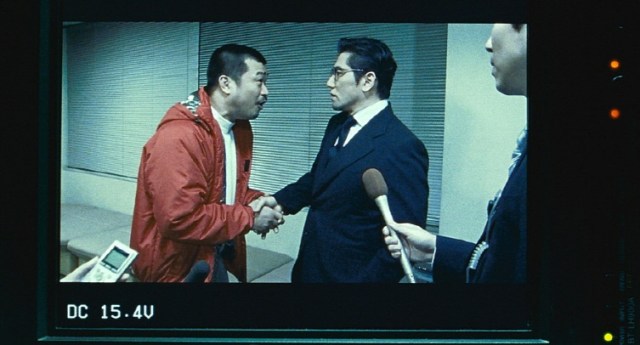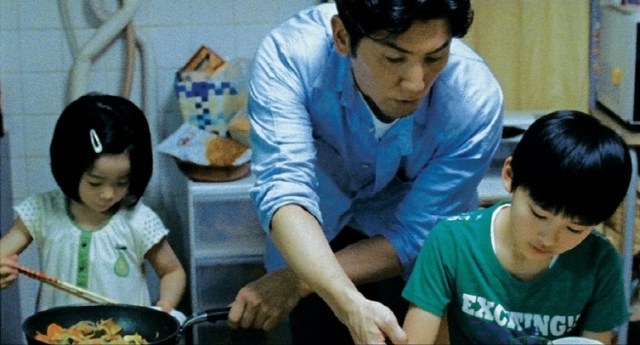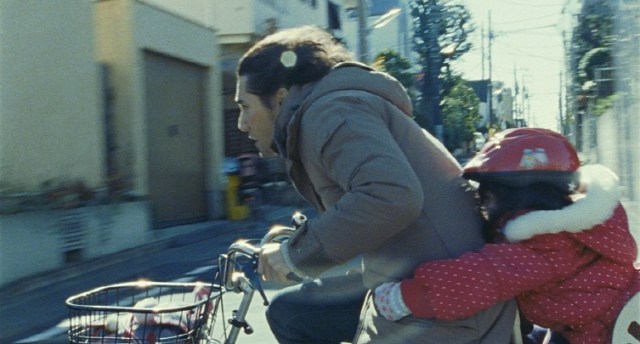
As an intimate story about loss and grief, Japanese film “The Long Excuse” is sometimes surprisingly amusing with small precious moments of wry humor and keen observation. While never overlooking the dark, melancholic elements of its story, the movie deftly balances itself between drama and comedy, and it is alternatively funny and touching to observe how its rather unlikable hero comes to learn some valuable life lessons through his accidental emotional journey.
The movie opens with Sachio (Masahiro Motoki from “Departures” (2008)) getting a haircut from his hairstylist wife Natsuko (Eri Fukatsu) in their apartment, and we come to learn a few things about their life as listening to their private conversation. Natsuko took care of their living for many years while her husband kept concentrating on his writing, and now they are living a more affluent life than before thanks to Sachio’s modestly successful writing career, but the gap between him and his wife looks more apparent as Sachio shows more of his self-absorbed side during their conversation. Natsuko is going to have a brief winter trip with her old school friend, but Sachio does not care much about that mainly because he is going to have a meeting with his mistress once his wife leaves.
In the very next morning, there comes a terrible news. Not long after a devastating bus accident is reported on TV, Sachio is notified that Natsuko and her friend are among those ill-fated passengers in that bus, and he soon finds himself getting lots of attention from the media. Although he does not feel that sad, he knows well as a public figure that he should present himself nicely in front of cameras, and he does that job fairly well while appropriately looking sad and devastated as a husband mourning for his wife’s death. Through online search, he subsequently checks how much he draws public attention, and he certainly gets satisfying search results.

During the meeting for the victims’ families, Sachio is approached by a truck driver named Yoichi (Pistol Takehara), who is none other than the husband of Natsuko’s friend. Not long after their first encounter, Sachio invites Yoichi and Yoichi’s two children to a restaurant dinner, and then Sachio gets himself more involved with this family than expected thanks to an inadvertent incident associated with Yoichi’s little daughter Akari (Tamaki Shiratori). After spending some time at Yoichi’s small apartment along with Yoichi’s son Shinpei (Kenshin Fujita) while Yoichi and Akari are at a hospital, Sachio tells Yoichi that he can take care of Yoichi’s children whenever Yoichi is absent due to his work, and Yoichi gladly takes Yoichi’s offer.
What does Sachio want from them? It is hard to say because the movie does not give any clear explanation on his motive, but the movie closely observes instead how he gradually comes to fill the void left by Yoichi’s wife. Besides being Akari’s babysitter, he also helps Shinpei’s study for the upcoming middle school entrance examination, and Akari and Shinpei are happy to have ‘Uncle Sachio’ around them. As time goes by, Sachio becomes another part of Yoichi’s family, and he even joins their summer vacation.
While depicting this part with gentle sensitivity, the movie has an acerbic fun with Sachio’s complicated emotional circumstance which even he does not seem to understand much. As spending more time with Yoichi and his family, he sees from them an opportunity to benefit him and does not hesitate to grab it, but he genuinely cares about them nonetheless, and his relationship with them makes him more aware of what a lousy husband he was to Natsuko. At one point, he willingly pretends to mourn for his dead wife when he visits the accident site along with TV program crew, but then he cannot help but be too emotional in front of the camera, and that leads to one of the most hilarious moments in the movie.

The director/writer Miwa Nishikawa, who adapted her acclaimed novel of the same name, started her directing career with “Wild Berries” (2003) after working under Hirokazu Koreeda in “After Life” (1998), and “The Long Excuse” is her fifth work. While the influence from her mentor is evident from leisurely narrative pace and thoughtful storytelling, the movie is relatively cooler compared to Koreeda’s movies, but it is no less humane than them as steadily maintaining its objective attitude to its characters, and we are amused by its characters’ human flaws while also touched by their better sides.
The performers in the movie are all excellent in their well-rounded performances. While playing his character’s egoistic aspects without any excuse, Masahiro Motoki subtly conveys the gradual change inside his character, and Pistol Takehara is effective as a rambunctious counterpart to Motoki’s more reserved acting. Despite her brief appearance, Eri Fukatsu leaves enough impression to hover around the film, and young performers Tamaki Shiratori and Kenshin Fujita hold their own places well around their adult co-stars.
Calm, restrained, but ultimately compassionate, “The Long Excuse” is a delicate human drama to appreciate for its effortless mix of humor and pathos. I admire how it gracefully arrives at the ending which will definitely make you smile for good reasons, and I also like that plain but sublime moment of epiphany preceding the ending. Although I have not watched Nishikawa’s previous works, the movie surely shows that she is an interesting filmmaker to watch just like his mentor, and I think I can expect another delight from her in the future.








Pingback: 10 movies of 2017 – and more: Part 2 | Seongyong's Private Place